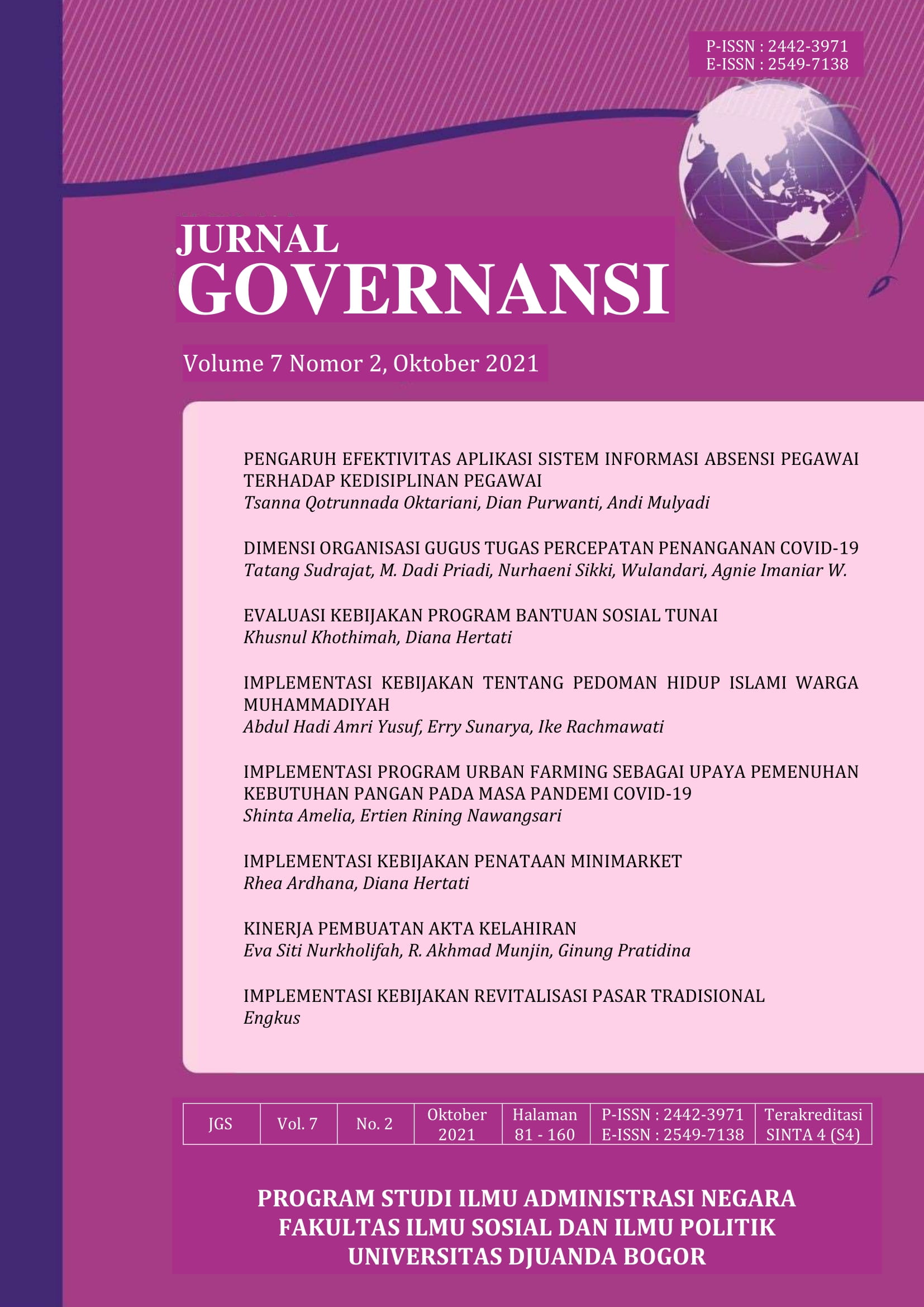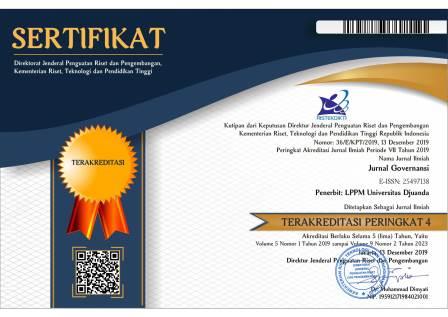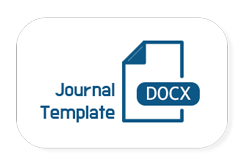PENGARUH EFEKTIVITAS APLIKASI SISTEM INFORMASI ABSENSI PEGAWAI TERHADAP KEDISIPLINAN PEGAWAI
DOI:
https://doi.org/10.30997/jgs.v7i2.3171Kata Kunci:
SIAP Application, Face Camera, Discipline, Information SystemAbstrak
This research, conducted in Local Secretariat of Sukabumi City, is motivated by three facts: (1) low level of civil servant discipline in relation to presence and punctuality at work, (2) system application easily manipulated by civil servants, and (3) frequent errors of system application by civil servants, which have impacts on the ineffectiveness of civil servant presence information system. This research aims to analyze the influence of civil servant presence information system on civil servant discipline. Method of this research is associative method combined with quantitative approach to test hypothesis. Hypothesis of this research is that the effectiveness of civil servant presence information system positively and significantly influences on the civil servant discipline. Results of this research indicate: (1) correlation coefficient 0.918 meaning positive and strongest effect, (2) determination coefficient 84.3% meaning effectiveness of civil servant presence information system as a factor that determines civil servant discipline, (3) linear regression meaning that every 1 score increase of the effectiveness of civil servant presence information system can increase 1.351 score of the civil servant discipline, and (4) t-test meaning that value of t 17.79 is bigger than value of t (α=10%, 2-tailed, dof=74-2) 1.671, therefore alternative hypothesis is accepted. This research generally concludes the positive and strongest influence of the effectiveness of civil servant presence information system on the civil servant discipline. For Local Secretariat of Sukabumi City, this research recommends to improve the accuracy of civil servant presence information system by adding the face camera.
Referensi
Buku
Bungin, B. (2014). Metodologi Penelitian Kuantitatif. Jakarta: Kencana Prenada Media Group.
Davis, G. (2018). Sistem Informasi Mana-jemen. Jakarta: PT Pustaka Binaman Pressindo.
Dunn, W. (2000). Analisis Kebijakan Publik. Yogyakarta: Gajah Mada University Press.
Hasibuan, M. (2019). Manajemen Sumber Daya Manusia. Jakarta: PT. Bumi Aksara.
Marakas, G. (2017). Pengantar Sistem Informasi. Jakarta: Salemba Empat.
Muhidin, S. & Maman, A. (2009). Analisis Korelasi Regresi dan Jalur dalam Penelitian. Bandung: Pustaka Setia.
Sarwono, Jonathan. (2012). Metode Riset Skripsi Pendidikan Kuantitatif (Meng-gunakan Prosedur SPSS) Tuntunan Praktis dalam Menyusun Skripsi. Jakarta: PT. Elex Media Komputindo Kelompok Gramedia.
Siagian, S. (2018). Manajemen Sumber Daya Manusia. Jakarta: PT. Bumi Aksara.
Silalahi, U. (2015). Metode Penelitian Sosial Kuantitatif. Edisi Revisi. Jakarta: PT. Refika Aditama.
Subarsono. (2015). Analisis Kebijakan Publik. Yogyakarta: Pustaka Pelajar.
Sugiyono. (2018). Metode Penelitian Kuan-titatif. Bandung: Alfabeta.
Sujarweni, V. Wiratna & Endrayanto, Poly. (2012). Statistika untuk Penelitian. Yogyakarta: Graha Ilmu.
Sutrisno, E. (2009). Manajemen Sumber Daya Manusia. Jakarta: Kencana Prenada Media Group.
Tim Dosen Administrasi Publik. (2019). Pedoman Penulisan Skripsi, Laporan Ristek dan Jurnal Penelitian. Suka-bumi: Program Studi Administrasi Publik Fakultas Ilmu Administrasi dan Humaniora Universitas Muhamma-diyah Sukabumi.
Jurnal
Ilmiana, Zukirah. (2016). Analisis Perban-dingan Penerapan Sistem Absensi Manual dan Finger Print terhadap Disiplin Pegawai Negeri Sipil di Kantor Dinas Perindustrian dan Perdagangan Kabupaten Gowa. Skripsi. Makassar: Universitas Islam Negeri Alauddin. http://repositori.uin-alauddin.ac.id/ id/eprint/3109.
Juliya, Zahrotus Sunnah. (2014). Hubungan antara Kedisiplinan Menjalankan Sholat Tahajjud dengan Kecerdasan Emosional Santri di Pondok Pesantren Jawaahirul Hikmah III Besuki Kabu-paten Tulungagung. Skripsi. Malang: Universitas Islam Negeri Maulana Malik Ibrahim. http://etheses.uin-malang.ac.id/id/eprint/809.
Kurniati, Ria. (2018). Pengaruh Penerapan Sistem Absensi Elektronik (Finger Print Scanner) terhadap Disiplin Kerja Pega-wai Negeri Sipil pada Dinas Kebersihan dan Pertamanan Kota Medan. Skripsi. Medan: Program Studi Ilmu Adminis-trasi Publik, Fakultas Ilmu Sosial dan Ilmu Politik, Universitas Sumatera Utara. http://repositori.usu.ac.id/ handle/123456789/6200.
Maeyasari, Erna. (2012). Pengaruh Efekti-vitas Penerapan Absensi Finger Print Terhadap Disiplin Pegawai Negeri Sipil Di Sekretariat Daerah Kabupaten Lebak. Skripsi. Serang Banten: Pro-gram Studi Ilmu Adminis-trasi Negara, Fakultas Ilmu Sosial dan Ilmu Politik, Universitas Sultan Ageng Tirtayasa. https://www.academia.edu/3252594/Pengaruh_Efektivitas_Penerapan_Absensi_Finger_Print_Terhadap_Disiplin_Pegawai_Negeri_Sipil_Di_Sekretariat_Daerah_Kabupaten_Lebak.
Ramzi, Muhammad; Jusak & Nurcahyawati, Vivine. (2016). Rancang Bangun Apli-kasi Pengolahan Nilai Rapor dengan Kurikulum 2013 di SMK Negeri 1 Cerme. Jurnal JSIKA, 5(7): 1-8. https://jurnal.dinamika.ac.id/index. php/jsika/article/view/1124.
Peraturan Perundang-undangan
Peraturan Pemerintah Nomor 53 Tahun 2010 tentang Disiplin Pegawai Negeri Sipil.
Peraturan Walikota Sukabumi Nomor 52 Tahun 2018 tentang Mekanisme Pemberian Tambahan Penghasilan Pegawai Berbasis Kinerja Bagi Pegawai Negeri Sipil Di Lingkungan Pemerintah Daerah Kota Sukabumi.
Laman
http://jdih.sukabumikota.go.id/home/profil/visi-dan-misi.
https://images.app.goo.gl/xqjyPgpT7LyVdugt8//systemerroraplikasisiap.
https://play.google.com/store/apps/details?id=id.suri.bkd&hl=in.
Sobri, K. (2018). Pemkot Sukabumi Luncur-kan Aplikasi Absensi Berbasis Android. Sukabumiupdate.com. https://sukabu miupdate.com/detail/ototekno/iptek/47754-Pemkot-Sukabumi-Luncur kan-Aplikasi-Absensi-Berbasis-Android.
Unduhan
Diterbitkan
Cara Mengutip
Terbitan
Bagian
Lisensi
Hak Cipta (c) 2021 JURNAL GOVERNANSI

Artikel ini berlisensiCreative Commons Attribution-ShareAlike 4.0 International License.
Authors who publish with Jurnal Governansi agree to the following terms:
- Authors retain copyright and grant the journal right of first publication with the work simultaneously licensed under a Creative Commons Attribution 4.0 International License that allows others to share the work with an acknowledgement of the work's authorship and initial publication in Jurnal Governansi.
- Authors are able to enter into separate, additional contractual arrangements for the non-exclusive distribution of the journal's published version of the work (e.g., post it to an institutional repository or publish it in a book), with an acknowledgement of its initial publication in Jurnal Governansi.
- Authors are permitted and encouraged to post their work online (e.g., in institutional repositories or on their website) prior to and during the submission process, as it can lead to productive exchanges, as well as earlier and greater citation of published work.




















